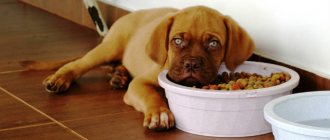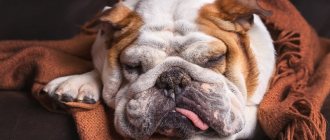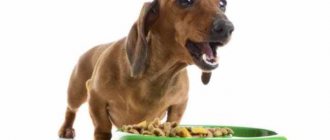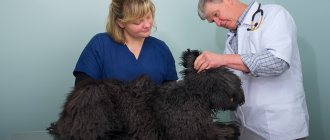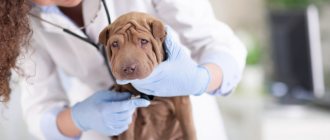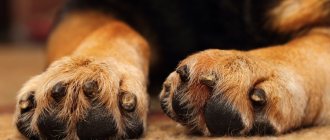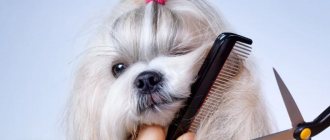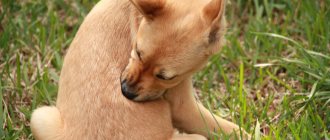Uncontrolled irritation of the nerve endings in the diaphragm, which causes its spasm and, as a result, hiccups - a sudden and uncontrollable phenomenon. Most often, the attack ends without the intervention of the owner, as suddenly as it began. However, if your dog hiccups, he will become uncomfortable, irritated, and distracted. You need to understand that there are a number of reasons that cause an attack and preventive measures to prevent inconvenience.
Causes
When a dog hiccups, the reasons for this lie in irritation of the phrenic and vagus nerves that innervate the diaphragm. This leads to its reflex contraction. At the same time, the intercostal muscles are tensed. The dog takes an involuntary breath, which is interrupted by a spasm of the epiglottis muscles. Thus, during the act of hiccups, the animal experiences a kind of short suffocation.
Irritation of the phrenic and vagus nerves can be caused by various reasons - both physiological and pathological. Based on this criterion, the types of hiccups are classified.
In most cases, hiccups in dogs are a natural reaction of the body . Otherwise, it is called short-term, since it usually appears sporadically and does not last long (from several minutes to half an hour).
Attacks of short-term hiccups are most often experienced by puppies and young dogs whose age does not exceed 8 months. Their body is not yet fully formed, and this is a very strong provoking factor.
The main causes of short-term hiccups in young animals are:
- unstable, overly excitable nervous system;
- weak ligaments (ligaments) that hold the internal organs in place;
- undeveloped muscles of internal organs.
Thanks to these features, in some situations the young body reacts with an attack of hiccups.
Most often this happens in the following cases:
- greedy absorption of poorly chewed food;
- swallowing air while eating;
- insufficient amount of liquid in the diet;
- dry throat after sleep or during active play;
- severe hypothermia (dogs with short hair often suffer);
- stress or severe fear;
- uncomfortable sleeping position causing stimulation of the phrenic nerve.
Attacks of short-term hiccups are harmless and end on their own after a short time.
Hiccups as a sign of illness
It is much less common for frequent hiccups in a young dog to be a symptom of a serious illness. It is called long-term (or indomitable) and is caused by another group of provoking factors.
Attacks of prolonged hiccups appear regularly and can last for quite a long time (for several hours or even days).
They are usually caused by a malfunction of various body systems:
- Digestive. The cause may be helminthiasis, poisoning of the body, enzymatic deficiency, flatulence, or intestinal obstruction.
- Respiratory, when inflammatory diseases of the upper or lower respiratory tract develop. Hiccups may be accompanied by coughing, sneezing, and difficulty breathing. The most dangerous are asthma attacks or respiratory allergies.
- Nervous. Hiccups can occur as a complication of nervous distemper, or be a consequence of recently suffered meningitis, encephalitis, or complicated enteritis. It is accompanied by neurological symptoms - lack of coordination of movements, disorientation in space, circling, paw tremor.
- Cardiovascular. A prolonged attack may be a symptom of a developing heart attack or stroke. Older dogs are most susceptible to these diseases.
Attacks of pathological hiccups occur after a recent injury.
If a pet has swallowed a foreign object - a small toy, a pine cone, a pebble, then hiccups are accompanied by strong salivation. In such situations, urgent consultation with a veterinarian is always necessary.
Causes of hiccups in newborn puppies
There are quite a few reasons why a puppy hiccups often and, unfortunately, not all of them are harmless. Hiccups are divided into several types; they can be short-term or long-term.
The following factors can provoke short-term hiccups:
- hypothermia;
- rapid filling of the stomach;
- binge eating;
- the pet swallows food too quickly;
- great physical activity;
- consumption of dry industrial food, after eating which the pet becomes thirsty;
- long games with the owner.
Note! Mostly short-term hiccups do not pose any threat, since they pass quite quickly and have no consequences.
The main provoking factors for prolonged hiccups:
- developmental pathologies or diseases of the cardiovascular system;
- foreign objects entering the digestive system;
- developmental pathologies or diseases of the gastrointestinal tract;
- complications after plague;
- difolariasis;
- diseases of the central nervous system;
- worms.
Hiccups cannot be the only symptom of developing diseases, so it is important to closely monitor the dog's condition. Complete or partial lack of appetite, lethargy and refusal to play, restless sleep and nausea are good reasons to take your pet to the veterinarian.
Height
Typically, puppies and young dogs are susceptible to hiccups. In very young babies this may be due to the preservation of the reflex in the first months after birth. Thus, hiccups strengthen the muscles of the esophagus and lungs. Seizures, if they last no more than an hour, are considered normal for animals while they are growing. The older the dog gets, the less often this happens.
Therefore, experts believe that during the period of physical and psychological development there is no need to worry about why the puppy hiccups. But if something is suspicious or the dog is lethargic, does not eat well, and hiccups appear frequently and last a long time, this is a reason to visit a doctor.
Is it dangerous
Hiccups themselves, as a physiological reaction, do not pose a danger to the life of the animal . The degree of danger of an attack for a dog is determined by how serious its causes are.
If the disorder is episodic in nature, the attacks last a short time and go away on their own, then there is no reason to worry. This is a natural reaction of the body to one or another external irritation.
If hiccups continue for a long time, attacks are repeated daily, accompanied by other alarming symptoms, then you need to look for internal pathology, which is the cause of sudden spasms of the diaphragm. It is necessary to take the animal to a veterinary clinic as soon as possible for professional diagnostics.
When the norm turns into pathology
If a dog hiccups after eating and there are no other alarming symptoms and it feels fine, then there is no reason to worry. In the future, you need to ensure that the puppy or adult dog does not swallow food too quickly, and give food in small portions at a time.
Warning symptoms that require consultation with a specialist - the dog hiccups and licks its lips, does not eat, vomits or feels sick, has a cough, wheezing, and weakness. Such manifestations may be signs that the pet has swallowed a foreign object and scratched the esophagus. Feeding the animal long bones can also cause symptoms.
If a pet hiccups every day, regardless of feeding, internal pathology is sometimes the provoking factor. In most cases, the disease is accompanied by other symptoms described above.
Veterinarians identify several reasons why a dog hiccups constantly or very often and for a long time:
- gastrointestinal pathologies;
- CNS lesions
- heart and lung diseases;
- oncology;
- dirofilariasis;
- intoxication.
Gastrointestinal diseases such as gastritis, gastroenterocolitis, pancreatitis, and esophagitis can cause hiccups in dogs. Additionally, other symptoms are present: licking accompanied by constant salivation, vomiting and nausea.
Epilepsy, encephalitis, and brain tumors also contribute to the manifestation of the reflex. Stroke and ischemia can cause a physiological reaction. Tumors of the lungs, neck, mediastinum, pancreas, liver or esophagus also often provoke hiccups.
Dirofilariasis is a form of helminthiasis in which parasites affect the lungs, heart, and in some cases the brain, spinal cord and abdominal cavity. Infection is manifested by poor appetite, wheezing, lethargy, and bloody sputum. Intoxication of the entire body occurs. If parasite infestation is not diagnosed promptly and treated, it can be fatal.
One of the reasons why a puppy hiccups and often swallows saliva is intoxication of the body due to poisoning, helminthiasis. In adult dogs, kidney pathologies can cause an accumulation of toxic substances in the body.
Growing pains
Some experts believe that hiccups are normal for a puppy. They call this phenomenon Episodes of (short and infrequent) hiccups as the puppy goes through all stages of psychological and physical development are considered normal. The older the animal gets, the less often this happens.
There is an opinion that hiccups are a kind of rudimentary reflex of puppies that remains with them from the time they were in the womb. In this way they can strengthen the muscles of the esophagus and lungs while they are supposedly “under water”. If the hiccups last no more than an hour, then there is no particular cause for concern.
How to help
The owner can independently help the pet only if it is known that the dog is healthy and hiccups are a natural reaction of the body.
Simple measures will help eliminate the factors that provoke the attack, and, therefore, speed up its completion:
- It is necessary to monitor how the ward takes food. It is useful to encourage him to eat more slowly by placing a bowl of clean water next to the food . If hiccups do start, you should gently massage your stomach, give you a drink of warm water, and distract you with a piece of sugar or a cookie.
- If the dog swallows some air along with food, it should be removed from the stomach. To do this, put the dog on its hind legs and hold it in an upright position until the air burps.
- If the hiccups are associated with hypothermia, you should immediately warm the dog, thereby eliminating the risk of a cold.
- During an attack, it is useful to distract the dog by offering to play. A walk in the fresh air will help change the breathing rhythm, which will also help the hiccups end as quickly as possible.
- Frequently recurring attacks often indicate that the dog is infected with worms. To eliminate this provoking factor, regular deworming should be carried out. In childhood, the procedure is carried out regularly every 3 months, in young animals and adult dogs - every six months.
What to do if hiccups don't stop?
If home attempts to stop hiccups are unsuccessful, you should take the animal to the veterinarian as soon as possible.
The doctor may determine that the attacks are caused by instability of the nervous system, a violent reaction to a stressful situation, or fear. In this case, sedative drug therapy has a good effect.
As prescribed by the doctor, the owner will be able to independently treat the pet with medications that reduce anxiety levels and reduce the reaction to stress.
Typically, in such cases, injections of the following medications are prescribed:
- Cerucal. This drug has an antiemetic and antihiccup effect, improves the quality of digestion, and eliminates the reflux of gastric juice into the esophagus.
- Seduxen. A tranquilizer, has a sedative-hypnotic effect, relieves muscle spasms, treats stress and stress-like conditions, and increased anxiety.
- Aminazine. Neuroleptic with a strong sedative effect. Relieves psychomotor agitation, reduces anxiety and stress response. The drug has a side effect - a strong hypnotic effect.
Games and food
If hiccups appear in an animal after eating, this is due to the stomach filling too quickly when the dog greedily absorbs food. In some situations, this phenomenon also appears in puppies that consume dry foods and insufficient amounts of water. Together with dry food, the pet involuntarily swallows air with its mouth, which causes the diaphragm to contract, entering the stomach and lungs. This also happens when the dog begins to lick his lips.
In this case, it is advisable to increase the volume of liquid in the dog’s “menu”. Experts also advise pre-soaking dry types of food in clean water.
Also, hiccups can begin if the puppy has recently finished frolicking with its relatives. The reason is a dry nasopharynx. To solve the problem, the dog just needs to pour water. You can also put the puppy on its hind legs and hold it in this position for several minutes.
Another fairly common cause of contractions of the diaphragm in animals is considered to be severe stress or some kind of significant excitement.
Prevention
To prevent attacks of hiccups from disturbing the animal, it is important to avoid factors that can provoke them by following the rules of caring for your pet.
First of all, be attentive to your dog’s feeding regimen:
- Feed your dog at the same time every day.
- Do not give too hot or cold food.
- It is important that the serving size is appropriate for the age and size of the dog.
- The dog needs constant access to clean water.
- Soak dry food for small puppies thoroughly.
In addition, other preventive measures are necessary:
- It is recommended to protect the dog from hypothermia;
- the dog should move a lot, walk in the fresh air;
- you should protect your pet from stressful situations;
- it is important to carry out regular deworming;
- Every six months you need to come with your dog to the veterinary clinic for a preventive examination.
Frequent attacks of hiccups in a dog should not go unnoticed, because there is a high probability that a serious illness is hidden behind them.
If you have a worrying symptom or illness, take your pet to the veterinarian. You may need serious treatment or surgery.
When to take your pet to the vet
Prolonged and frequent hiccups in dogs, which cannot be corrected and are accompanied by accompanying symptoms, require mandatory diagnosis. Due to the variability of possible causes, you will have to undergo a clinical examination and blood biochemistry, as well as undergo an ultrasound of the lungs and gastrointestinal tract.
Due to the high likelihood of complications such as heart attack and stroke, it is necessary to make an appointment with a cardiologist and neurologist. If nervous system instability is detected, your pet may be prescribed medications to reduce stress levels.
Reasons why a puppy or adult dog hiccups
Hiccups are a very unpleasant, sudden, uncontrollable phenomenon. This problem occurs quite often in dogs. The reasons why a dog or puppy hiccups can vary.
In some cases, this occurs after eating or as a result of fear, irritation, excitement and other reactions to a stressful situation (especially for puppies). In other cases, the causes of hiccups may not be obvious.
Usually this phenomenon does not cause any harm and does not pose any danger to the health of the animal. Puppies may hiccup immediately after waking up, as well as during sleep. According to veterinarians, this process is normal for young dogs, since their body is still developing and is therefore very sensitive to external stimuli. As your pet gets older, hiccups will occur much less frequently.
Why does a puppy hiccup and what to do about it?
Beginning dog breeders are often frightened by the phenomenon of hiccups in dogs. Although such a breathing disorder in an animal can occur for a variety of reasons and manifest itself in both puppies and adult dogs. Moreover, veterinarians advise owners not to worry too much about their pet if the hiccups last a short amount of time. And vice versa, urgently take him for examination if the dog hiccups continuously for 2-3 hours in a row, since in this case the phenomenon can act as a symptom of a serious pathology. The article will discuss the causes of hiccups, as well as methods of its treatment and prevention.
conclusions
Hiccups in dogs appear in the same way as in humans. Scientifically speaking, a convulsive contraction of the diaphragmatic muscles occurs. The diaphragm itself is a muscular septum that separates the sternum from the abdominal organs.
In most cases, in young dogs, the contraction of the diaphragm occurs very sharply. In this case, attacks of suffocation are possible, which do not last long. During hiccups, a characteristic sound occurs, the cause of which is the involuntary and very rapid closure of the glottis. Thanks to numerous studies, it has become known that puppies first begin to hiccup in the womb.
How to help your pet with hiccups?
- For short-term hiccups after eating, the dog should be given warm water to drink. You can also give your dog a piece of sugar to eat.
- If the cause of hiccups in a dog is the rapid swallowing of food, and with it air, then after eating you can massage its stomach with light movements.
- If your dog hiccups frequently or for a very long time, the first thing to do in this case is to worm it, if you have not done this for a long time. Because often the cause of long-term and frequent hiccups in a dog is a helminthic infestation. If you have dewormed, but the dog still hiccups, we consider other possible causes.
- If the hiccups do not go away, some dog breeders advise taking the animal by the front paws and lifting them so that he stands on his hind legs for a while. This exercise costs about three minutes.
- If hiccups occur periodically, it is better to consult a veterinarian. As a rule, you can stop the attack by administering metoclopramide (Cerucal) - this is a specific dopamine receptor blocker that calms hiccups, especially if it is associated with gastrointestinal problems. Either by introducing tranquilizers (Seduxen, Tazepam) or antipsychotics (Etaperazine, Aminazine). BUT! These medications must be taken as prescribed by your doctor and in the dosage strictly prescribed by him.
Hiccups are quite common in pets. And the owner should not worry if he hears characteristic sounds after the dog eats food or for no reason. But veterinarians emphasize that hiccups are more common in young dogs. So, let's learn about the reasons for this common phenomenon and the actions of the owner in such cases.
What to do if your dog hiccups frequently
Nobody wants to watch their pet suffer, so if hiccups occur, the following methods should be taken:
- Hiccups after sleeping in the morning or lying down for a long time every day, then she just needs to change her position or add a little physical activity. Play with your pets, arrange a special walk or training with balls and sticks. Even a light jog will help improve the situation.
- When hypothermia occurs, it is necessary to increase body temperature and two methods are suitable for this: warming up or active movements, which will help fight the cold.
- You can cope with stress by removing the cause of your worries. If an animal experiences fear from a nightmare, then it is enough to wake it up and caress it if necessary. If the dog is frightened by sharp sounds, large crowds of people on the street or noise from equipment, then it is better to take it to another place, and you should act carefully, accurately and without raising your voice.
- After eating, give your dog a good drink of water; if necessary, you can massage the belly with gentle movements. The latter copes well with hiccups in puppies, since initially after birth the mother carefully licks the babies and massages the tummy with her tongue, so this stage of care can be carried out by the dog owner.
These rules apply to cases where the hiccups go away within a few minutes. If cases are constantly repeated and last long enough, then you need to contact a veterinarian.
Physiological mechanism of hiccups
Hiccups are a sharp, reflex inhalation caused by irritation of the nerve endings in the diaphragm and its subsequent spasm. This process is a vicious circle in which, due to muscle tension, the vagus nerve is irritated, and it, in turn, leads to even greater muscle contraction. Usually the attack ends suddenly and without outside intervention.
- I’m hiccupping for some reason.
In a little more detail, the abdominal organs are separated from the chest by the diaphragm - a dense muscular partition that plays an important role in the respiratory process. Due to contractions of the diaphragm, air enters the chest cavity, and as a result of its relaxation, air leaves the chest out.
The functioning of the septum is regulated by the vagus and sympathetic nerves, which have numerous branches in its tissues. Significant irritation of the nerves provokes an impulse that enters the cerebral cortex. From here the nerves are given a command to produce a sharp contraction of the muscles of the thoracic septum.
The result is a sharp inhalation. Sudden closure of the airways obstructs airflow, and inhalation occurs with a brief suffocation. The passage of air through the narrow space of the ligaments creates a characteristic compressed sound. Hiccups are essentially short-term spasms of the diaphragm (cramps).
What causes hiccups in dogs?
Hiccups are an involuntary contraction of the diaphragm.
The diaphragm is a dome-shaped layer of internal skeletal muscle that separates the chest from the abdomen. This is the main muscle involved in breathing. When a dog inhales, the diaphragm contracts and moves downward, freeing the lungs to expand space in the chest cavity. When a dog exhales, the diaphragm relaxes and moves up into the chest cavity. Usually the movements of the diaphragm are smooth and regular, but when this muscle suddenly begins to contract, we call it hiccups.
Involuntary diaphragmatic twitches also cause hiccups in people. Hiccups can be caused by eating or drinking too quickly and swallowing too much air.
Hiccups can also happen when dogs are excited or stressed, or when they inhale an irritant. Vigorous play and rapid breathing can also cause this disorder.
Reverse sneezing can sometimes be confused with hiccups. But this is a different symptom. Reverse sneezes occur when a dog vigorously sucks in air through the nose.
Reasons why a dog hiccups
There are two types of hiccups in dogs:
The specific variety depends on the cause of its occurrence:
- The symptom goes away quickly if hiccups are caused by severe overeating. The problem is typical for those cases when the basis of the animal’s nutrition is dry food with insufficient water. If your puppy hiccups after eating, it is recommended to switch to liquid food or pre-wet dry food in water.
- An adult pet or puppy often hiccups after playing. This is due to the fact that during physical activity the dog’s nasopharynx dries out. In this case, the pet needs plenty of fluids.
- If the dog, and especially the puppy, is a representative of a hairless or short-haired breed , you should not be surprised that he often hiccups. When walking in the cool season, it is recommended to wear special animal clothing on your dog. It is necessary to ensure that the animal is not in drafts.
- Prolonged hiccups may indicate serious pathologies , for example, a foreign object entering the stomach, helminthic infestation, bacterial infection, the onset of a heart attack, damage to the nervous system, etc.
Dry food
For what reasons does it appear in dogs?
This problem can be caused by various factors. Among them:
- Binge eating. Usually observed in pets who quickly absorb food after a walk or a long break between feedings.
- Hypothermia of the body.
- Long games. For this reason, hiccups are often observed in puppies.
- Heavy loads or stress.
- Excessively active behavior of an animal due to choleric temperament.
- Infection of the body with worms. With this problem, your pet will experience hiccups in the morning. You can suspect a worm infestation in a pet if a similar symptom is observed for several days in a row.
- Features of the development of the body.
- Gastrointestinal pathologies.
- Entry of foreign objects into the stomach. You can suspect the presence of such a problem if your dog hiccups, licks itself and tries to vomit.
- Severe mechanical injuries to the pet's stomach.
- Pinching of the vagus nerve during sleep. The phenomenon is quite rare, but safe. It can easily be eliminated by moving the dog to a more comfortable position.
- Heart attack.
- Diseases of the central nervous system.
It is extremely difficult to independently determine for what reason your pet periodically or constantly has hiccups. However, by the nature of this symptom one can determine whether it is associated with any serious conditions or not. If it occurs once, passes quickly and is not accompanied by any other signs of illness (nervousness, loss of appetite, apathy), there is no need to worry about it. If a dog often hiccups, it exhibits a change in behavior, general weakness, and increased irritability; this symptom indicates serious disorders in the body and requires special attention from the pet owner. Such an animal must be shown to a doctor.
When to see a doctor urgently
Prolonged and frequent attacks are a signal to immediately seek specialized help. Only a detailed examination will help determine the true cause of the condition and, accordingly, take the necessary measures in a timely manner, and sometimes even save the pet’s life. After all, prolonged hiccups can signal an incipient heart attack or a developing disease of the digestive system.
Buying a dog, regardless of breed and size, is a big responsibility. An animal can grow up to be a full-fledged and healthy member of the family only if the owner carefully monitors its health and promptly consults a veterinarian.
What do we have to do?
You can eliminate an annoying attack in the following ways:
- Give your dog clean, warm water.
- Perform a light abdominal massage using circular movements in a clockwise direction. This method is effective if the cause of spasms is overeating.
- This method will help you get rid of hiccups: you need to take the dog by the front paws, lift them and thereby bring it to a vertical position. After 2-3 minutes of standing, the hiccups will go away.
- Deworm your pet.
For frequent and prolonged attacks, you will need to consult a veterinarian.
If the cause of hiccups is problems in the gastrointestinal tract, the doctor, having established an accurate diagnosis, can prescribe the following medications:
- Cerucal (an anti-hiccal agent) or Seduxen (Diazepam) has an anticonvulsant and central muscle relaxant, that is, reducing muscle tone, effect;
- Etaperazine (neuroleptic, has a muscle-relaxing effect);
- Aminazine (sedative).
Aminazine
Despite the fact that, in general, hiccups do not pose a threat to the life and health of the dog, there are special cases when prolonged and frequent spasms indicate serious diseases of the animal:
- Pneumonia and bronchitis.
- Gastritis, pancreatitis, stomach ulcers and other diseases in which the gastrointestinal mucosa becomes inflamed.
- Myocardial infarction.
- Stroke, brain injury, central nervous system disorders.
- Severe intoxication, which can be caused by taking medications, kidney failure, infections, etc.
Is it possible to ignore hiccups?
Experts are convinced that short-term forms of this phenomenon, often occurring after eating, will not harm the pet in any way. Another thing is long-term hiccups, which last for hours and even days, and which, at first glance, do not have any good reason. It is important to understand that if a dog hiccups for a long time and continuously, then this is abnormal and can lead to such unpleasant consequences as:
- dysfunction in the pet’s respiratory system, which is aggravated by snoring, coughing, frequent and shallow breathing;
- pathologies of the central nervous system, manifested in trembling of the limbs, complete or partial loss of coordination, and impaired attention in the dog. Those individuals that have recently suffered from serious illnesses such as enteritis or meningitis are especially vulnerable to this;
- problems with the gastrointestinal tract, including constant flatulence and indigestion.
Elimination methods
For short-term dog hiccups, it is permissible to use the following recommendations from veterinarians:
- If the factor that caused the hiccups was food, then the owner, to eliminate it, can try to do the following: give the pet warm water or give him a piece of refined sugar, and then pat his tummy.
- Take your pet by the two front paws and “dance” with him a little. This will not only distract your shaggy friend, but will also allow air to escape in the form of a burp.
- Puppies benefit greatly from a light and gentle abdominal massage. It relaxes the dog's muscles, which means the chance that the hiccups will go away will increase significantly.
- Dogs who have become hypothermic outdoors or at home in a draft will benefit from intensive warming. It will not only eliminate hiccups, but also protect your pet from colds.
- Intense physical activity is no less effective during such breathing problems. Engage your pet with active play or a short run.
- Classic methods include scaring the pet. However, animal psychologists advise doing it extremely moderately, so as not to provoke the dog into aggression or even more hiccups.
Prevention of recurrent stroke
The reasons that led to the occurrence of a stroke most often do not disappear anywhere and continue to affect a person. The risk of recurrent stroke depends on their strength and combinations. Prevention of recurrent stroke is called secondary. List of conditions that people pay attention to first:
- Arterial hypertension is the main risk factor for stroke. It increases his risk by 5 times;
- diabetes;
- smoking;
- coronary heart disease (the risk increases by 2-4 times);
- atrial fibrillation (increases the risk by 3-5 times);
- hyperlipidemia (high levels of “bad” cholesterol);
- thrombocytosis;
- overweight.
Accordingly, it is necessary to correct these conditions and bring them back to normal to reduce the risk of recurrent stroke. Drug therapy is only part of the treatment. Diet, exercise, and giving up bad habits are important.
Antihypertensive drugs
It is recommended to reduce blood pressure, even if it is raised very slightly or within the normal range: “upper” 120-139 mmHg, “lower” 80-89 mmHg. So a decrease of 5 mmHg. helps reduce the development of stroke by 30%.
Diet, exercise, and giving up bad habits are important in preventing a recurrent stroke.
The superiority of some groups of antihypertensive drugs over others has not been proven. When prescribing, the doctor has to take into account the individual characteristics of the patient, compatibility with other drugs, and minimizing side effects. At the same time, for patients after a stroke, it is important not only to reduce blood pressure, but also to stabilize it as much as possible, even if slightly above the target values. For this use:
- Amlodipine - long-acting calcium channel blockers;
- Perindopril, Diroton, Renitek - angiotensin-converting enzyme inhibitors;
- Lozap, Cozaar, Valsartan - sartans, angiotensin receptor blockers;
- Hypothiazide, Indap are diuretics.
Drugs that prevent blood clots
With various arrhythmias, the risk of thrombosis and stroke increases up to 4 times. Anticoagulants and antiplatelet agents can be used to prevent these conditions:
- Warfarin;
- Thrombo ACC;
- Plavix;
- Chimes.
Taking this group of drugs is usually long-term, one might say lifelong.
Statins
They help not only fight atherosclerosis and high cholesterol levels, but also stabilize the surface of already formed plaques, reduce the level of inflammation in the vascular wall, which will also reduce the risk of thrombosis:
- Mertenil;
- Atoris;
- Basil.
Read more about statins in the article.
What is hiccups?
Every person has felt the discomfort of hiccups on themselves, a tiring inconvenience, hasn’t it? So why do seizures occur? Hiccups in a dog are a sharp breath in response to an “incorrect” nerve impulse. An intense inhalation is accompanied by a spasm of the intercostal muscles, as a result of which something like a “reverse thrust” occurs. The body receives a signal to shut off the air. Each spasm is accompanied by a characteristic sound - this is a reflex closure of the epiglottis. Next, a “chain reaction” occurs, the vibration of the chest again irritates the nerve endings, the diaphragm contracts and another attack occurs.
Note! Puppies are more susceptible to hiccups than adult dogs and there are a number of reasons for this: weak ligaments holding internal organs, disproportionate distension of the stomach, increased nervous excitability, etc.
Are hiccups dangerous for dogs?
It is generally accepted that attacks of hiccups are a natural reaction of the body to irritation of nerve endings. The reasons that cause short-term and harmless hiccups are as follows:
- The dog hiccups after eating. Possible causes are overeating, swallowing air, dry or coarsely cut food. Provide peace to your pet while eating, especially for owners who have several charges. Competition is an incentive to swallow without chewing. Food should be served warm, moist and chopped. It is recommended to place bowls on a stand at the height of the dog.
- After resting or waking up in the morning - refers to choleric people who jump up and run as soon as they open their eyes. Most often associated with drying out of the nasopharynx.
- A puppy who has fallen asleep in an unnatural position may hiccup while sleeping or upon waking up; this is due to physical irritation of the vagus nerve.
- After active games, the reason is also associated with drying out of the mucous membranes.
- Fright.
- Hypothermia is more common in short-haired and hairless dogs.
If the animal hiccups every day, the attacks are not associated with “natural” causes or last too long, you should see a veterinarian. To compile an anamnesis, you need to pay attention to the work:
- Digestive system - possible worm damage, diarrhea, flatulence, indigestion, blockage.
- Respiratory system – presence of cough, shortness of breath, snoring, irritation of the mucous membranes.
- Central nervous system - loss of coordination, unfocused gaze, tremors, recent diseases (distemper, meningitis, enteritis).
Possible causes also include foreign bodies entering the stomach. If the dog could have eaten part of the toy, rope, or soil, an x-ray will be needed. Any intoxication lasting more than 2 hours has a detrimental effect on the functioning of the central nervous system; in parallel with hiccups, tremors, weakness, salivation, vomiting, and “cyanosis” of the mucous membranes are observed.
Important! Hiccups lasting more than 1 hour can be one of the “harbingers” of a heart attack or stroke!
Natural and unhealthy hiccups - what's the difference?
Everyone has probably experienced debilitating hiccups and knows how serious discomfort this condition can be. Natural and unhealthy hiccups - what's the difference?
Since the true causes of hiccups have not been clarified, it is considered a harmless, natural reaction of the body.
However, in human medicine there are cases where people went crazy and even died after being hospitalized due to debilitating hiccups.
The main reasons that can cause both natural and unhealthy hiccups are:
- Rapid absorption of water and food.
- Overeating is a strong distension of the stomach.
- Allergy.
- Moments of high activity.
- Stress and extreme excitement.
- A metabolic disorder that can lead to behavioral changes, including hyperactivity.
- Freezing.
All of the above reasons are associated with improper care. Even metabolic disorders can be associated with improper feeding, but there are also genetic factors. Additionally, some dogs are prone to fuel eating due to heredity or psychological reactions.
Diseases
There may be more serious reasons for long hiccups. For example, entry of a foreign body. Causes of prolonged hiccups:
- diseases of the gastrointestinal tract (for example, gastritis, etc.);
- dirofilariasis.
It happens that prolonged hiccups occur due to damage to the central nervous system. For example, this is how a complication after a nervous-type plague may manifest itself. Monitor your dog for other associated symptoms. Although it is better to show the animal to a veterinarian
Prolonged hiccups can occur in a puppy before a heart attack. Therefore, look at your pet’s behavior; he may need emergency help, or better yet, go to the clinic.
If hiccups occur periodically, it is better to consult a doctor. Typically, to stop an attack, metoclopramide (medicine "Cerucal"), a dopamine receptor blocker, is used. The drug will help calm hiccups if they are associated with gastrointestinal problems. But you should use medications only as prescribed by a veterinarian.
Stroke and rehabilitation
Stroke is an acute disease that is associated with circulatory disorders and is manifested by such symptoms from the nervous system as:
- motor, speech, sensory, coordination, visual and other disorders;
- general cerebral disorders: changes in consciousness, headache, vomiting for more than 24 hours;
- death in a short period of time.
There are 2 main forms of stroke:
- ischemic (when some part of the brain stops receiving oxygen for various reasons, for example, blockage of the lumen of a vessel with a blood clot);
- hemorrhagic (when a vessel ruptures, blood permeates the brain tissue and non-traumatic damage or subarachnoid hemorrhage occurs).
Rehabilitation after a stroke begins as early as possible. An integrated approach to treatment combines drug therapy, physiotherapy, and training to restore lost functions. There are 3 main areas in pharmacotherapy:
- prevention of relapse, that is, repeated stroke. Typically, 1 in 10 people will have another stroke in the first year;
- treatment of individual symptoms;
- pathogenetic treatment.
